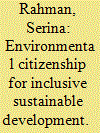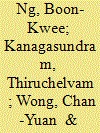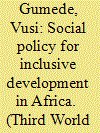|
|
|
Sort Order |
|
|
|
Items / Page
|
|
|
|
|
|
|
| Srl | Item |
| 1 |
ID:
170229


|
|
|
|
|
| Summary/Abstract |
Using environmental citizenship as the basis of its activities and initiatives, a community organisation, Kelab Alami, successfully combined environmental action with a socio-ecological systems approach to counter environmental and social injustice. The organisation fused traditional ecological knowledge with science for use in community-initiated ecotourism; engaged with surrounding developers, local authorities and the state government to mitigate environmental damage and maximize job opportunities for the community; nurtured and supported local entrepreneurship efforts and continues to spread environmental awareness and protection. This paper traces the development of Kelab Alami, the training and empowerment of youthful citizen scientists, and its attempt to garner multi-level support and collaboration for its environmental actions. This is a grounded illustration of resource mobilization in action, and a local view of a community’s efforts to cope with poverty, environmental degradation and urbanization; a model that could be adapted and adopted by other communities facing similar circumstances and threats.
|
|
|
|
|
|
|
|
|
|
|
|
|
|
|
|
| 2 |
ID:
173821


|
|
|
|
|
| Summary/Abstract |
Using environmental citizenship as the basis of its activities and initiatives, a community organisation, Kelab Alami, successfully combined environmental action with a socio-ecological systems approach to counter environmental and social injustice. The organisation fused traditional ecological knowledge with science for use in community-initiated ecotourism; engaged with surrounding developers, local authorities and the state government to mitigate environmental damage and maximize job opportunities for the community; nurtured and supported local entrepreneurship efforts and continues to spread environmental awareness and protection. This paper traces the development of Kelab Alami, the training and empowerment of youthful citizen scientists, and its attempt to garner multi-level support and collaboration for its environmental actions. This is a grounded illustration of resource mobilization in action, and a local view of a community’s efforts to cope with poverty, environmental degradation and urbanization; a model that could be adapted and adopted by other communities facing similar circumstances and threats.
|
|
|
|
|
|
|
|
|
|
|
|
|
|
|
|
| 3 |
ID:
146649


|
|
|
|
|
| Summary/Abstract |
In the past, studies on inclusive development involve mainly the perspective of equitable distribution of economic and societal outputs. This study, however, takes a different approach and analyses the potential roles of regional coordination mechanisms (RCMs), specifically universities and research council's networks within Southeast Asia, in disseminating the innovation-related activities for inclusive development or Innovation for Inclusive Development (IID). The literature on innovation intermediaries within the realm of innovation systems studies was used to establish the framework of the study. The findings indicate that RCMs have a huge potential role to play. However, due to a number of reasons, including lack of funding support, lack of attention and commitment to IID, weak engagement with industry and non-governmental organisations, the implementation of the IID activities was rather poor. As a whole, the study argues that current approaches are not well positioned and it is fragmented preventing the effective use of RCMs despite their potentials for IID efforts. The study attributes this to the systemic failures in the regional coordinating systems. In enhancing the role of RCMs in IID, this study recommends the promotion of IID platform, the leveraging of non-government organisations and industry as well as energising the Southeast Asia engagement in promoting IID.
|
|
|
|
|
|
|
|
|
|
|
|
|
|
|
|
| 4 |
ID:
157713


|
|
|
|
|
| Summary/Abstract |
The paper revisits the discourse on development in Africa, following in the footsteps of leading development thinkers and focusing on social policy. Some of the thinkers and scholars have specifically and directly discussed development discourse in Africa. Others have made insightful points regarding inclusive development in Africa even though not directly engaging with development discourse. The paper also acknowledges earlier thinking regarding development in Africa, including perspectives that deal with underdevelopment. The paper concerns itself with the critical role that social policy can play in ensuring inclusive development in Africa. The interface between economic and social policy is emphasised. Although Africa faces many intractable challenges, most of which are externally imposed, robust social policies will go a long way in bringing about effective social and economic development. In the main, though, Africa needs a comprehensive socio-economic development approach that can ensure lasting inclusive development. Social policies are critical for any development endeavour in African countries. Another main point that the paper makes is that economic transformation is not enough to fully advance wellbeing in Africa (and probably the world at large). By restructuring economies in Africa, not much would be achieved though some gains would be made.
|
|
|
|
|
|
|
|
|
|
|
|
|
|
|
|
|
|
|
|
|